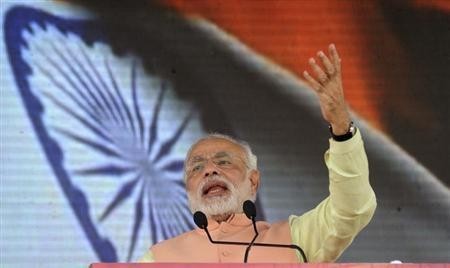
As Narendra Modi took up the sceptre of a nation of a billion on Monday, his decision to invite all the SAARC leaders for the oath-taking ceremony was certainly a masterstroke - one that reaffirms India's position as the SAARC leader.
The South Asian Association for Regional Cooperation, which had gradually been losing its edge in recent years, might once again find itself on a path of growth, especially by strengthening ties with neighbours.
Modi, who himself had suggested inviting the SAARC countries, certainly knows what he is doing. Getting all the eight nations under one roof, months before the 18th SAARC summit (set to be held in November), clearly shows that Modi is gunning for global leadership in the time to come.
On the foreign policy front, there is much for India to gain. Modi's invitation would be an impetus for India to improve its ties with the seven-nation regional grouping.
Pakistan Prime Minister Nawaz Sharif had to brave a torrent of opposition back home from hardliners, Islamists and - to some extend - even his own Army but he still accepted the invitation.
While India and Pakistan continue to be on a deadlock on the Kashmir front, there is much to be done on improving trade between the two neighbouring countries. Despite the benefits of proximity, the countries have barely traded with each other.
Though Pakistan had agreed to grant the most favoured nation status to India, the final approvals have been stuck in diplomatic tussles. However, it is expected that in the 30-minute meeting with the new Prime Minister of India, Pakistan PM Sharif would grant non-restrictive trade status to India.
Another controversial invitee on the guest list is Sri Lankan President Mahinda Rajapaksha. But there is much for India to gain on several mutually beneficial fronts.
Modi may have to face the disgrunt of Tamil Nadu Chief Minister Jayalalitha and the entire Tamil population but from a diplomatic point of view, a better relation between the two countries will be in India's interest, especially to diminish the growing influence of China in the Sinhalese nation.
From a national security point of view, a better tie-up with Sri Lanka will help India in accessing terrorist elements which seem to be constantly landing in the country, and also a curb on counterfeit Indian currency. An improvement in trade ties is more of an advantage to Sri Lanka but its growth does benefit an average Indian.
Modi clearly understands that Bangladesh is also very important for India, especially as it shares its longest land border with the country. Dhaka has always been supportive to India, particularly in the fight against insurgency.
West Bengal Chief Minister Mamata Banerjee had created quite a hindrance for Bangladesh from getting the Teesta river water sharing agreement. Modi understands that for strengthening the Land Boundary Agreement issues, it is important that the Teesta accord is passed.
Among the SAARC countries, there is only Bhutan that has remained an ideal neighbour till date. But in recent times, New Delhi has been worried about the growing influence of China in the country. And that is something that Modi will be working on in the days to come.
The problem is similar but bigger in Nepal and Maldives as India will have to handle both Pakistan and China's influence in those regions. Nepal has remained a hotbed of smuggling operations for Pakistan, and in recent times even China's influence seems to be growing in the country.
While Maldives, with its strategic location in the Indian Ocean-Arabian Sea, seems to have caught the eye of both China and Pakistan. And now it is up to the Modi-led Indian government to bring in policies and diplomacy ties to keep them in check.
Meanwhile, with Afghanistan, India will have to play the role of a big brother, especially as the US troops are slowly withdrawing from the country. Keeping Afghanistan out of the reach of Taliban will be of interest to New Delhi. And the Modi government will have to ensure that the wheels of democracy are kept running in country.
But it will all have to start with Pakistan, and once Modi has the relations improving between the two countries, the rest of the SAARC will fall in line - paving the way for India to be the SAARC leader.

















